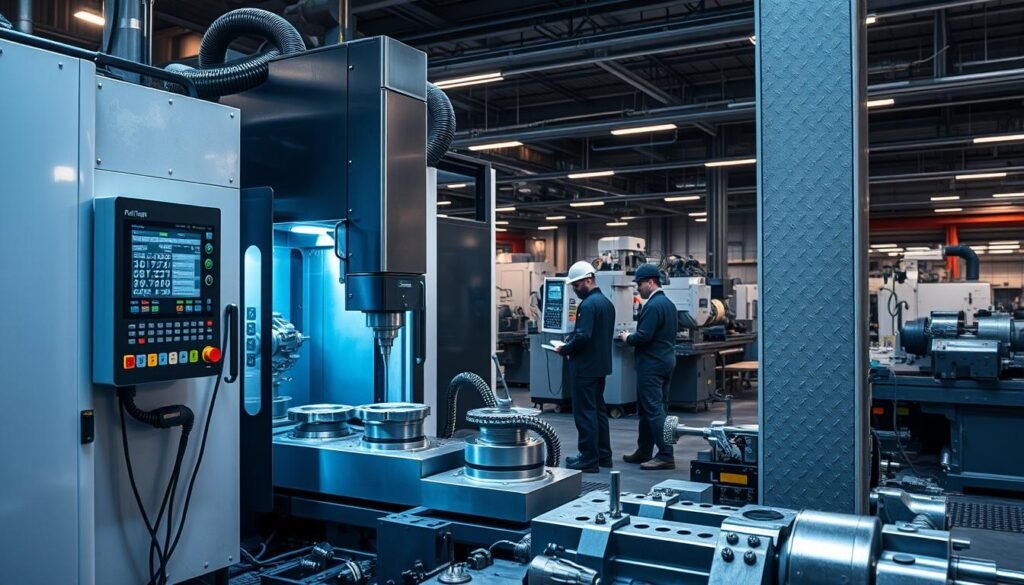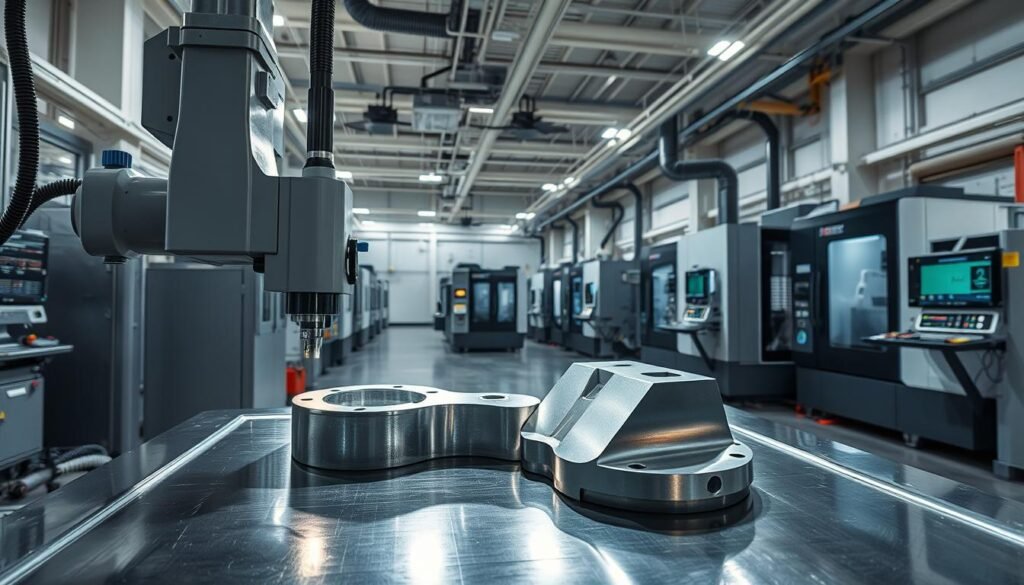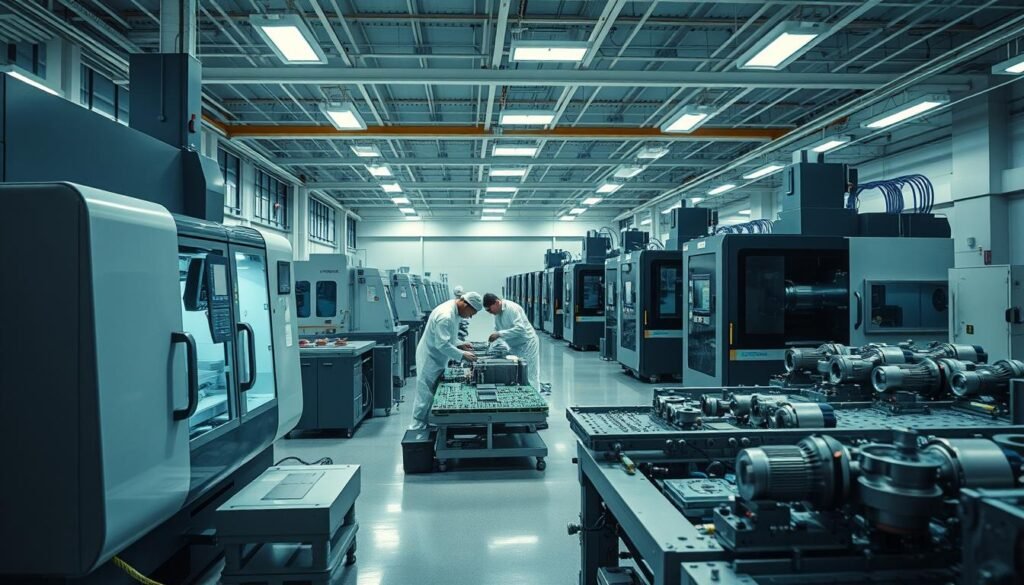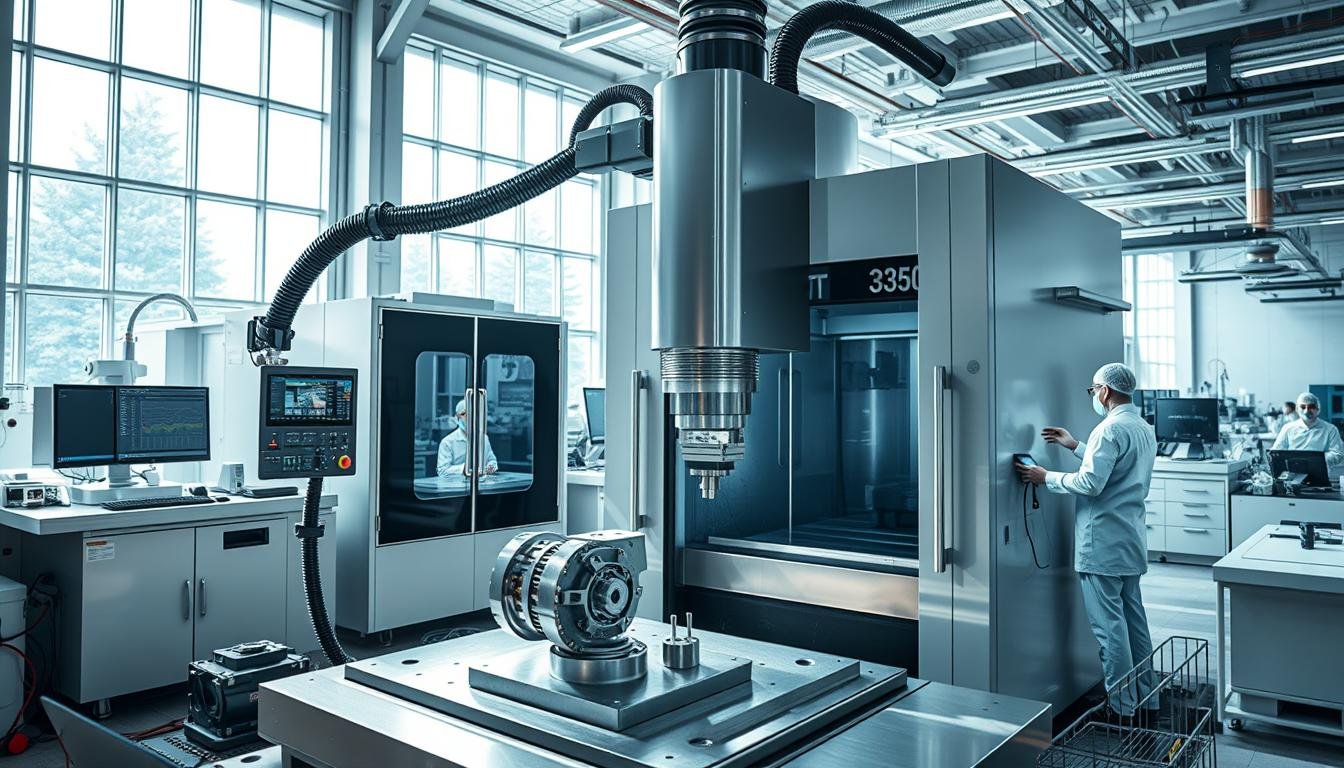At Mekalite, we know CNC machining has changed the game in making things. It lets us create detailed parts with great accuracy. Our CNC Machining Service offers custom solutions for many industries. We aim to be efficient and reliable.
We’ve made big strides in tech, making it possible to work with complex shapes. We follow ISO standards to ensure top-notch quality. Our goal is to lead in Precision Engineering by using new tools and green practices. This makes us a reliable partner for companies wanting to improve with CNC Precision Machining.
Key Takeaways
- Mekalite offers CNC machining services that promote high precision in production.
- We provide customized solutions tailored to meet specific industrial requirements.
- Our exceptional quality control aligns with ISO 9001:2015 standards.
- We utilize a variety of materials, including high-performance plastics and metals.
- Innovation through AI integration enhances our CNC machining capabilities.
- Our services cater to a multitude of sectors, including aerospace and medical devices.
Understanding CNC Machining and Its Importance
CNC machining is key in today’s making world. It brings top accuracy and speed. This tech cuts down on labor costs and boosts production speed.
It uses advanced tools for cutting and shaping. This meets many industrial needs.
The Role of CNC Machining in Modern Manufacturing
CNC Machining Service is vital in today’s factories. It makes parts with exact fits. This is thanks to tools like CAD and CAM.
CNC machines control every detail. They can make even complex shapes right. Multi-axis machines make detailed designs possible and consistent.
Benefits of CNC Machining in Industry
CNC Machining offers more than just precision. Its main benefits are:
- Enhanced Precision: It can achieve tolerances as tight as ±0.001 inches (±0.025 mm). This means products are reliable.
- Material Versatility: It works with many materials. From hard metals like titanium to plastics for medical use.
- Reduced Material Waste: It uses raw materials better. This saves costs and is good for the planet.
Materials Used in CNC Machining
CNC machining works with many materials. Some common ones are:
- Metals like aluminum, steel, and titanium
- Plastics like nylon and polycarbonate
- Composites for special uses in aerospace and cars
This flexibility makes CNC machining essential. It’s used in many fields. From aerospace to medical, it’s vital for making parts.
The Evolution of CNC Machining Technology

CNC machining technology has come a long way. It started in the late 1940s and has grown a lot since then. This growth has made today’s processes very advanced.
Knowing the key milestones helps us understand today’s CNC innovations. It also shows us what’s coming next in CNC technology.
Historical Background
The story of CNC starts in the late 1940s. John T. Parsons and Frank L. Stulen began working on it. They wanted to make aircraft parts better.
At first, CNC machines used punch-tape technology. This made them less flexible and less efficient. But then, punch cards came in the early 1950s. Parsons introduced them, making programming more complex.
Modern CNC Innovations
In the late 20th century, CNC moved towards software. This made setup times shorter and precision better. MIT’s work in 1959 was a big step forward.
They made the first computer-controlled NC machine. This led to CNC being able to do two-dimensional tasks. The APT language came in 1956, making programming easier.
By 1972, CAD/CAM software was used. This allowed for detailed 3D designs. Now, CNC can do many things thanks to new tech like multi-axis machines and AI.
Future Trends in CNC Technology
The future of CNC is all about being green and making things on demand. Using eco-friendly materials is becoming more common. This helps reduce harm to the environment.
There are still problems like tool wear and heat. But new cooling systems and materials are solving these issues. CNC needs to keep getting better to meet these challenges.
Training workers is key. They need to know the latest in CNC technology. This helps them use CNC machines to their fullest potential.
Key Features of CNC Machining Service

Our CNC machining service has several key features. We focus on high precision and tolerance. This lets us make intricate parts for many industries.
We use technology to make complex shapes and designs. Our service can work with many materials. This meets a wide range of needs.
High Precision and Tolerances
High Precision CNC Machining is key for parts with tight tolerances. It reduces human error and keeps quality high. Automated steps make production faster and more efficient.
Complex Geometries and Designs
CNC machining can create complex shapes. It’s better than old methods for making hard shapes. This lets us make new designs for many fields, like aerospace and medical.
Material Versatility
Our CNC machining can work with many materials. This includes metals, plastics, and composites. We can drill, mill, or turn, meeting our clients’ specific needs.
CNC Machining Service – Precision Engineering

At Mekalite, we’re proud to offer custom CNC machining for many industries. This includes aerospace, automotive, and medical manufacturing. We focus on precision engineering to meet our clients’ unique needs.
Customized Solutions for Various Industries
We know each industry has its own needs. So, we provide solutions that work well for them. Our CNC machining services cover:
- Metals like aluminum, stainless steel, and titanium
- Plastics such as ABS, polycarbonate, and PEEK
We can make parts with very tight tolerances. This ensures they fit perfectly. We handle both small and big orders, with prices that grow with your needs.
Significance of Precision in Automated Systems
As automated systems get better, precision becomes more important. Our 80,000 square foot machine shop has 16 top-notch machining centers. This lets us make parts quickly, sometimes in just 1 day.
Integration with Advanced Manufacturing Techniques
We use the latest manufacturing methods in our CNC machining. This includes:
- Post-processing like anodizing, chromate coating, and powder coating
- Handling up to 20 tons with our 35 overhead cranes
- Checking part geometry to save costs through design improvements
We check our work carefully to ensure quality. This supports both automated and traditional factory work. With no limits, we keep production going without pause, meeting all your needs.
Applications of CNC Machining in Different Industries

CNC machining is key in many industries. It helps make precise parts that boost innovation and efficiency. We’ll look at its important roles in several sectors.
Aerospace Industry Applications
The aerospace world depends on CNC machining for important parts. Here are some examples:
- Airfoils and turbine blades need to be light and precise.
- Antennae must have detailed designs for good communication.
- Landing gear and manifolds need to be reliable.
- Bushings and radiofrequency materials improve efficiency.
Medical Device Manufacturing
In Medical Device Manufacturing, precision is crucial for safety and function. CNC machining makes:
- Surgical tools that must be safe for use.
- Bone screws and plates for orthopedic needs.
- Custom implants and parts for better medical devices.
Electronics Components Production
CNC machining is vital in making Electronics Components. It helps create:
- Heat sinks and connectors for better electronic circuits.
- Precision tooling and molds for small parts.
- Die-casting parts for high-tech gadgets.
Advantages of CNC Machining Services
CNC machining services bring many benefits to manufacturing. They make processes more efficient and cost-effective. We use the latest technology to deliver top-notch results across various industries.
Efficiency and Cost-Effectiveness
The CNC Machining Efficiency is impressive. CNC machines work 24/7, cutting down on wait times. They also reduce errors by automating tasks.
This means we can work with great precision. It saves materials and lowers labor costs. This makes production more affordable.
Computer control also means fewer mistakes. This leads to higher quality products.
Rapid Prototyping and Turnaround
Our rapid prototyping helps get products to market fast. CNC machining is flexible and can handle complex designs. This is key for quick product development.
For more on CNC Machining Efficiency, check out CNC machining benefits.
Consistency and Quality Assurance
Quality is a top priority for us. Every part we make is consistent, ensuring high quality in mass production. Our strict quality checks build trust with customers.
We use advanced tech and monitoring systems. This ensures our work is always up to standard. For more on our services, visit Mekalite’s CNC services.
Driving Innovation Through CNC Prototyping
CNC prototyping is key in making products. It lets teams test and improve ideas fast. This method is quick, which is great for new ideas in many fields.
It helps companies get their products to market faster. This is very important in today’s fast-paced world.
Importance of Prototyping in Product Development
CNC prototyping makes high-quality models. These models meet exact needs and designs. This is good for companies because:
- They can make designs better and more functional fast.
- They can use many materials, which helps innovation in CNC in different areas.
- It’s cheaper, which helps make unique products for many people.
In fields like aerospace and medical devices, CNC prototyping is very important. It makes parts with high precision. This is thanks to advanced methods like multi-axis machining.
Case Studies of Successful Prototyping in Automation
Looking at development case studies shows how CNC prototyping helps in automation. For example, there are projects like:
- The VersaPlate T4, which makes robots more flexible.
- The Magnetic Levitating Platform, which shows off new designs.
- Custom spacer blocks for different mechanical parts.
These show how quick and flexible CNC prototyping can lead to great products.
Challenges Faced in CNC Machining Operations
The CNC machining world has many challenges for companies to face. Keeping up with new tech is hard. New tech often means new standards, needing better machines and software.
Starting small can be tough because of the high costs. This is a big problem for small businesses trying to get into the market.
Keeping Up With Technological Advances
New CNC machines can do complex cuts. But, they are expensive. This means businesses have to spend a lot on machines and software.
Upgrading can make things better but takes time. It can make production slower.
Skilled Labor Shortages
Finding skilled workers is a big challenge. Good training is key to using new CNC tech right. Without skilled people, quality can suffer.
It’s hard to find and keep good machinists. This is a major problem for success.
Supply Chain Disruptions and Their Impact
Supply chain problems make things worse. They can make materials hard to get. This can slow down production and raise costs.
Companies must find ways to keep things running smoothly. This is crucial for the CNC machining industry’s future. For more on CNC Machining Challenges, check out this link.
Embracing the Future of CNC Machining
The future of CNC machining is changing fast. New technologies and green practices are leading the way. As we use Industry 4.0, our work gets better and more connected.
Today’s steps will make our industry stronger and more eco-friendly. This is a big leap forward.
Integration with Industry 4.0
Industry 4.0 is changing CNC machining for the better. Tools like Siemens Solid Edge 2024 use AI to improve designs and making things. Digital twins help us test and predict, making things smoother.
Augmented and mixed reality are also making a big difference. They could make our work 12% better. This shows how important these new tools are.
Developments in Sustainable Manufacturing Practices
Now, making things is all about being green. We’re cutting down on waste and using less energy. We’re using new materials and recycling more.
Hybrid systems mix old and new ways of making things. This lets us make complex shapes that are cheaper and better for the planet.
Future Technologies and Innovations
The future of CNC machining looks bright. AI and generative design are making things faster and cheaper. These changes will change how we make things.
But, we face challenges like keeping things safe and finding skilled workers. We’re working hard to solve these problems. We want the industry to grow and stay strong.
Conclusion
CNC machining is key in today’s manufacturing world. It shows how important precision and new ideas are. As things change, CNC machining will become even more crucial for making high-quality products.
With CAD and CAM software, we can make things with amazing precision. This is true for many materials, like metals and plastics. It helps us make a wide range of products.
Mekalite is all about giving businesses the tools they need to succeed. We know the future of making things depends on new trends, like AI and automation. These changes make CNC machining better and help us use less energy and waste.
Looking to the future, CNC machining will get even better with new tech like 3D printing. This will let us create new designs and improve materials. By choosing the right tools and materials and keeping our skills sharp, we can unlock CNC machining’s full potential.
The future of CNC machining is about being efficient and precise. But it’s also about making things in a way that’s good for the planet and full of new ideas.
FAQ
What is CNC machining and why is it important?
CNC machining uses computer-controlled machines to make precise parts. It’s key for modern making because it makes complex shapes with great accuracy. This boosts productivity and cuts down on waste.
What are the benefits of CNC machining services?
CNC machining services bring many benefits. They offer high precision, less waste, faster making, and work with many materials. These points make CNC machining a must for many industries.
What industries benefit from CNC machining?
Many industries use CNC machining, like aerospace, cars, medical devices, and electronics. These fields need precise parts for safety, performance, and efficiency.
How does CNC prototyping contribute to product development?
CNC prototyping helps engineers and designers test and improve ideas fast. This speeds up getting new products to market and makes them better.
What challenges does the CNC machining industry face?
The CNC machining world faces challenges like keeping up with new tech, a lack of skilled workers, and supply chain problems. Solving these is key to staying competitive and sustainable.
How is Mekalite ensuring quality in CNC manufacturing?
At Mekalite, we focus on strict quality control in CNC machining. Our dedication to precision and customer happiness means every part meets high standards and goes beyond what clients expect.
What materials are commonly used in CNC machining?
CNC machining works with many materials like aluminum, stainless steel, plastics, and composites. This flexibility lets us create custom solutions for various projects in different fields.
How does Industry 4.0 impact CNC machining?
Industry 4.0 brings better connection and data use in CNC machining, leading to smarter automation and better efficiency. Using these technologies helps makers improve their processes and stay competitive.


